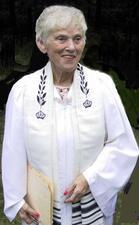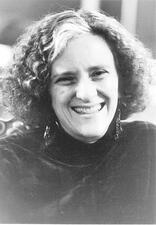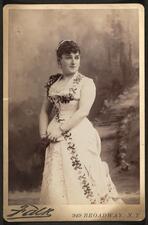Religion: Cantors

Angela Buchdahl
Angela Warnick Buchdahl is the first Asian American to be ordained as a rabbi and cantor. She is the senior rabbi of Central Synagogue in New York and is a major leader in American Judaism’s continued work on diversity, equity, inclusion, and innovation.

Cantors: American Jewish Women
Women’s vocal leadership in synagogue music began with zogerin (women prayer leaders) in the women’s gallery. In the nineteenth century, women began participating in mixed choral and community singing, and some opera singers acted as cantors in important Reform congregations. In the 1970s and 1980s, the Reform and Conservative movements began formally investing women as cantors, and today a plurality of cantors in liberal movements are women.

Conservative Judaism in the United States
Women have played a pivotal role in propelling the Conservative Movement to confront essential issues including Jewish education and gender equality. The Movement’s attention to issues such as the religious education of Jewish girls, the status of the agunah (deserted wife), equal participation of women in ritual, the ordination of women, and innovations in liturgy and ritual to speak to women’s experiences has helped to shape the self-definition of Conservative Judaism, and has enabled talented Jewish women to reach new heights in religious leadership.

Julie Johanna Engel
Julie Johanna Isner Engel dreamed of becoming a professional opera singer in Germany in the 1930s, but the rise of the Nazis interrupted that dream. Escaping to the United States, she trained her voice in synagogue choirs and local opera performances. In the 1970s, she took a cantorial position at a synagogue in Queens, one of a pioneering generation of women cantors.
Hadassah (Spira Epstein)
Hadassah Spira Epstein was a major dance artist of the twentieth century, a performer of Jewish, Hindu, and other ethnic dance forms, and a leading force in presenting the dance of other cultures to the American public. She was a pioneer in bringing Jewish dance to the United States and was recognized as such in the first U.S. Congress on Jewish Dance held in New York City in 1949.

Jewish Feminism in the United States
Challenging all varieties of American Judaism, feminism has been a powerful force for popular Jewish religious revival. The accomplishments of Jewish feminists have transformed American Jewish life, even as the ultimate goal of gender equity and shared power has yet to be fully realized.

Women, Music, and Judaism in America

Betty Robbins
Betty Robbins is often heralded as the first female cantor – in fact, that honor goes to Julie Rosewald. However, Robbins was the first woman to be officially designated as cantor. The Board of Trustees at Temple Avodah in Oceanside, New York unanimously appointed Robbins as their cantor in 1955.

Julie Rosewald
Julie Eichberg Rosewald was America’s first woman cantor. Known as the “Cantor Soprano” at Temple Emanu-El in San Francisco, she served between 1884 and 1893. Rosewald enjoyed a brilliantly successful career in opera as well as being a composer, author, teacher, and professor of music.

Sabrina Sojourner
Hazzan Sabrina Sojourner is a seasoned cantor whose spoken word midrashim create a larger vision of who we are as a people, inspiring us to take better care of ourselves, each other, and our planet.


